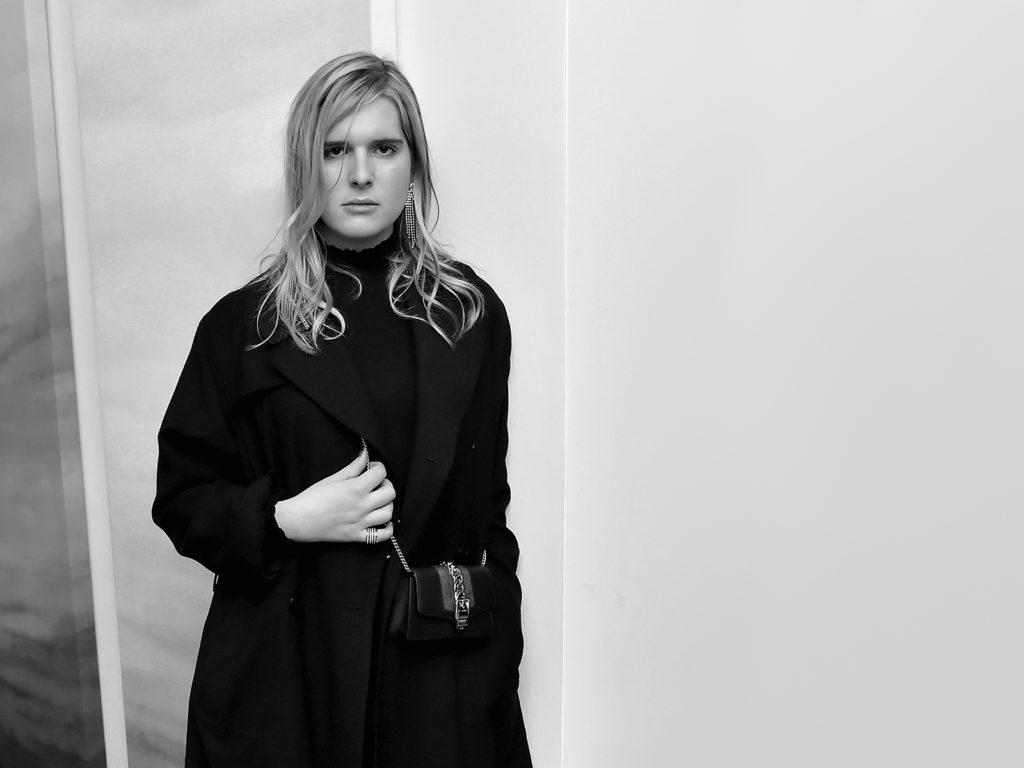
“I think that strange and beautiful flowers bloom in the shadow of the Hollywood sign where absolutely no one is looking for them,” says Hari Nef, on the phone from Los Angeles. It’s a steamy summer Friday the 13th, and despite having relocated to the city in recent months, she’s calling from a hotel room where she is busy writing her first screenplay. “Of course, my air conditioning is broken,” she laughs.
Screenwriter is just the latest title for the multitalented actress, model, and self-professed accidental activist, whose rise to fame came at a significant time for transgender visibility, despite her hesitance to let gender identity define her career trajectory. In 2015, she was the first trans model to be signed to IMG after posing for buzzy downtown New York brands like Hood By Air and Eckhaus Latta. The same year, she appeared on Amazon’s Transparent as Gittel, a hauntingly distinct memory of the Pfefferman family’s past. In 2017, she became a face of Gucci beauty alongside Dakota Johnson and Petra Collins (which she says is “enough for me if that’s all I ever do”).
Become an S Insider
The latest in fashion, beauty, design, and arts & culture.
This fall, the 25-year-old makes her big-screen debut in Assassination Nation, a horror satire that takes aim at everything from racism to toxic masculinity through a vividly gory lens. The film, directed by Sam Levinson, follows a trio of party girls (Odessa Young, Suki Waterhouse and Nef) as all hell breaks loose after an anonymous hacker begins dumping secrets of the town’s inhabitants. Set in a modern-day Salem, Massachusetts, Assassination Nation is a thinly veiled metaphor for witch hunts in the digital age, something Nef is all too familiar with. “[The film] is not just a takedown of conservative MAGA white guys who hate women,” she says. “It’s an indictment of the polarized ideology of the United States today, which is all-encompassing and full of prejudice on both sides,” she says.
Assassination Nation was the biggest acquisition to come out of this year’s Sundance Film Festival, which is not surprising given its adept take on today’s many cultural schisms. “There’s so much content that is clearly engineered for the neoliberal gaze, and I don’t think that it’s necessarily content that’s going to bridge gaps and spark difficult conversations,” she says. “Assassination Nation isn’t that. There’s something for everybody to latch onto. And then there are things that will directly contradict the thing they’re latching onto.”
Nef points to a scene in which her character, Bex, takes part in the skewering of the town’s mayor after it’s revealed that he is a cross-dresser. “I remember improvising a line where I decided that she, in that situation, would use a homophobic slur,” she says. “I think, fundamentally, this film harbours the interests of young women close to its heart but it doesn’t do that in a blind, millennial-pink, Internet-feminist way that completely disregards the complicated humanity of the people it’s fighting for—it acquiesces to the fact that these girls are not these feminist martyrs taking revenge. They’re not perfect. They have their own prejudices and aggressions.”
Despite the complex issues tackled in Assassination Nation, Nef isn’t looking to define her career through cultural activism. “I’m interested in good roles, well-written roles, and roles that challenge me,” she says.

